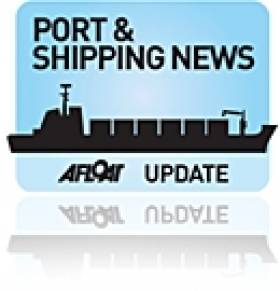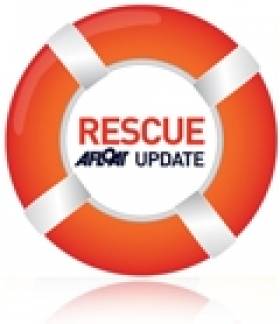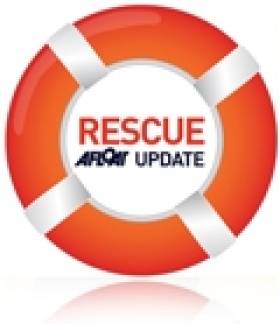Displaying items by tag: Hoegh Osaka
A&P Falmouth Customers Include Stricken Solent Vehicle-Carrier Ship
#A&Pfalmouth – Hoegh Osaka, the 51,770grt vehicle-carrier towed to Southampton following a deliberate grounding incident to save the vessel from sinking in the Solent last month, is undergoing repairs at A&P Falmouth, writes Jehan Ashmore.
The stricken-ship which had listed in early January, was unloaded of some 1,400 vehicles at the Hampshire port before proceeding to the Cornish ship-repairer. Offshore yesterday of the dry docks facility in the busy shipping lanes of the English Channel was a fleetmate, Hoegh Tokyo which departed Dublin Port over the weekend.
Hoegh Tokyo with a larger tonnage of 68,871 was transitting the English Channel with an eastbound passage. While making a westbound passage from the Baltic Sea to Cork albeit on the previous day, was the Marine Institute's RV Celtic Explorer (2002/2,425grt) which was a recent customer of A&P Falmouth.
As previously reported on Afloat.ie, the 65.5m vessel had a major upgrade of scientific equipment installed during an extensive refit under the supervision of P&O Maritime (Ireland) Ltd.
Following her survey work in both the Baltic and North Sea, the new equipment is to be tested with sea trials beginning today in Irish waters.
Among the vessels berthed in A&P Falmouth's facility are Irish Ferries Oscar Wilde which is to open the French route season on 25 February.
Staying on a ferry theme, Condor Ferries fast-ferry the Incat 86m built Condor Vitesse is also at the dry-dock facility. She along with sister Condor Express are to be replaced next month on the Channel Islands routes by a new 102m fast-ferry. The newcomer is the Condor Liberation due to make a debut just before Easter.
Also in Falmouth is one of Wightlink's Portsmouth-Fishbourne ferries, St. Cecilia which operates the service to the Isle of Wight. She originally began her Solent career with Sealink.
If 'Winds Take Over' Tugs to Abandon Solent Stricken Car-Transporter
#SolentSalvage- Tugs holding the listing stricken car-transporter, Hoegh Osaka (2000/51,000grt) in the Solent will according to BBC News, let go of the vessel if they lose control in gales set to sweep in.
The ship anchored at Alpha Anchorage, near Lee-on-the-Solent, has been positioned to re-ground on a sandbank.
Bram Sperling, from salvors Svitzer, said: "If the wind takes over the vessel we've informed the tugs to take care of themselves."
Severe gales of up to 75mph (120km/h) are expected on the south coast later.
As previously reported on Afloat.ie, on Saturday, one of the tugs helping to keep the ship in place collided with the vessel in high winds.
About 3,000 tonnes of excess water is also being kept in the vessel to give the ship stability in the expected stormy weather.
Hugh Shaw, of the Maritime Coastguard Agency (MCA), said: "The important thing is that the vessel is stable.
There is more coverage accompanied by photos in the BBC News report, by clicking HERE.
Tug Crashed Into Stricken Solent Car-Transporter Hoegh Osaka
#SolentSalvage - One of the tugs holding the stricken car-transporter Hoegh Osaka in the Solent has according to BBC News crashed into the vessel.
The tug moved from its position during high winds and collided with the ship with 1,400 cars on board during last Saturday afternoon.
No-one was injured but the tug was damaged and had to be replaced.
The salvage operation was hampered on Saturday because of poor weather conditions but the Maritime and Coastguard Agency (MCA) said salvors had since managed to board the ship.
The Svitzer salvage team is said to be refining its plans because further high winds are predicted.
The MCA said salvors were now intending to start work on the ship's ballast before pumping the 3,000 tonnes of water out of the vessel.
A spokeswoman said: "Yesterday, weather conditions prevented any activity on the vessel other than to connect the third tug.
As previously reported on Afloat.ie, an investigation has begun into the ship incident in which the owners, Hoegh Autoliners said she was deliberately ran aground off the Isle of Wight.
For more coverage the BBC News has a report here.































































